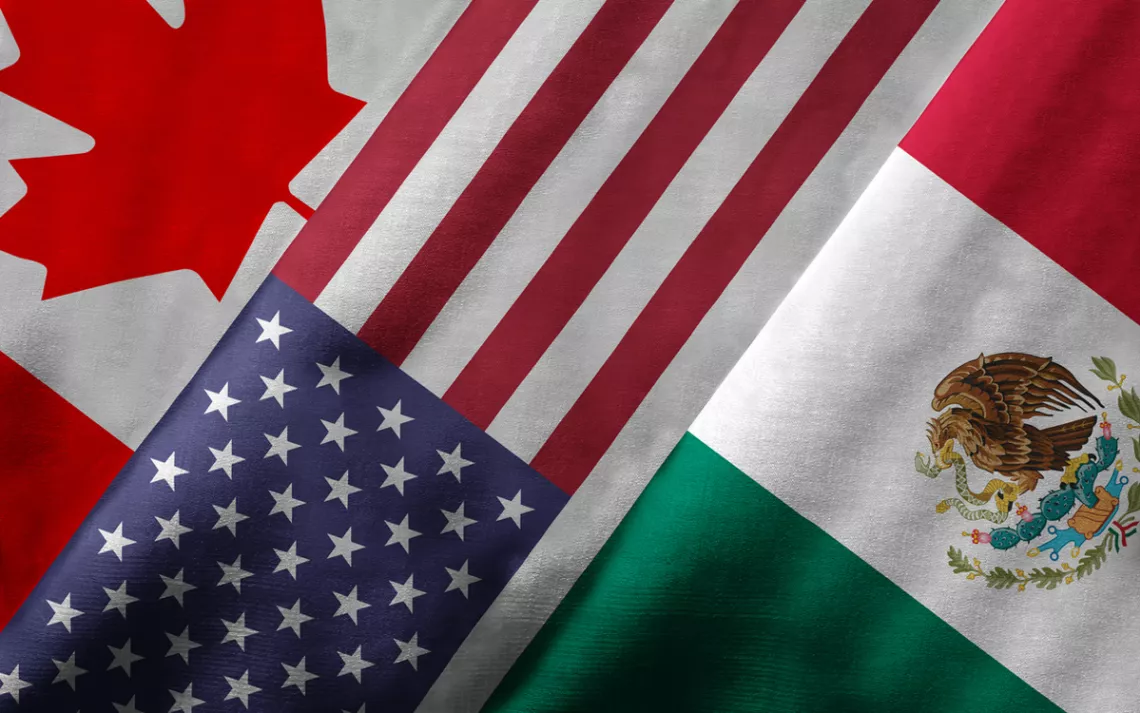Should We Fear a New NAFTA?
Spoiler: Yes, it could be terrible for the climate.
Right now, a tri-national team of negotiators is working feverishly to bring us a new North American Free Trade Agreement, or NAFTA. Their goal is to renegotiate the controversial trade deal before major elections for all three member states: Canada’s provincial elections in June, Mexico’s presidential election in July, and U.S. congressional midterms in November. This means that as soon as early May, we could have a NAFTA 2.0—one that would go to Congress for an up-or-down vote while its GOP majority is still intact.
That renegotiated NAFTA could be a disaster for the climate, according to a report published this week by the Sierra Club, the Council of Canadians, and Greenpeace Mexico. It doesn’t have to be that way: A better agreement could raise environmental and labor standards across all three countries, instead of engineering a race to the bottom.
Instead, it looks like NAFTA 2.0 will make it harder to fight pollution and climate change. Here’s how:
The Proportionality Rule
When NAFTA was first negotiated in the early 1990s, climate change was not an issue, but oil sure was. The United States wanted a steady supply, without having to play nice with oil-rich countries it wasn’t getting along with, like Venezuela, Iran, and Russia. U.S.-based oil companies also wanted access to crude closer to home, from which they’d been blocked since the 1980s when Pierre Trudeau’s National Energy Program put high tariffs on oil exported from Canada.
So NAFTA contained an unusual agreement, called the proportionality rule. It requires Canada to offer 74 percent of its oil, 52 percent of its natural gas, and 11 percent of its electrical production for export to the United States. With a guaranteed producer on one side and a buyer on the other, Wall Street firms began financing pipelines connecting Canada's tar sands to refineries in the United States—pipelines like Keystone XL.
The proportionality rule sets not only the percentage of Canadian oil that goes to the United States, but also what kind of oil goes into that percentage. This means that Canada would violate NAFTA if it stopped extracting crude from the Alberta tar sands, even though doing so is insanely expensive and creates so much pollution that the tar sands region has the atmosphere of a city like Los Angeles—minus the people.
When NAFTA was first negotiated, the United States tried to get Mexico to also agree to a proportionality rule. Mexico refused, but the United States is sure to try again with NAFTA 2.0.
A better NAFTA agreement would either eliminate the proportionality rule altogether, or acknowledge that the necessity of meeting climate targets supersedes it. If Canada is going to meet the target that it signed on to at the Paris climate accords—a 30 percent cut in carbon pollution by 2030—then it has to completely phase-out oil production from the oil sands and stop using coal and natural gas to make electricity.
Chapter 11
In NAFTA 1.0, Chapter 11 was added to ease the anxieties of U.S. and Canadian companies that wanted to do business with Mexico but were worried that Mexico would use its own court system to rule against and extract money from foreign investors. (Their worries trace back to 1938, when Mexico nationalized its oil industry and seized the in-country operations of 17 foreign oil companies.)
Chapter 11 gave companies the right to bypass the court systems of the states and provinces where they were doing business, and instead take their disputes to arbitration panels run by trade lawyers. In the years that followed, Mexico and the rest of NAFTA’s member countries expropriated exactly zero foreign infrastructure, but Chapter 11 still saw heavy use, as a lever against local social, health, and environmental policies. The United States was sued (unsuccessfully) after California banned MTBE, a gasoline additive manufactured by a Canadian company called Methanex. Mexico got sued (successfully) by California's Metalclad company after authorities in Guadalcázar denied it a permit to open a hazardous waste facility. (The same authorities had also denied a hazardous waste permit to the previous owner of the property, a Mexican company.)
Chapter 11 is particularly unpopular in Canada where, after Quebec passed a law banning fracking under the St. Lawrence River, Canada was sued by Lone Pine Resources, which held drilling rights to some sections of the river. Lone Pine is based in Canada but incorporated in Delaware, and it used that as justification for going through arbitration under NAFTA, rather than working its way through the Canadian court system. Late last year, Washington state canceled the lease for an offshore fish farm owned by Cooke Aquaculture, a Canadian firm whose neglect caused thousands of farmed salmon to escape into the territory of the wild and endangered Pacific salmon. Cooke is already threatening to sue for arbitration under Chapter 11.
A better NAFTA would remove Chapter 11 protections for foreign investors in industries that carry public health risks, like oil and gas drilling. If a company is concerned about recouping its investment, it should purchase risk insurance, rather than expecting communities to reverse environmental standards to help its bottom line. If a corporation feels it’s been treated unfairly by the courts, it should have to obtain the backing of its home country and try to resolve the problem through diplomacy.
A better NAFTA would also make clear that environmental standards can improve over time, and that a company isn’t guaranteed the same laws in perpetuity that it encountered when it first set up shop. It would absolutely not do what the United States is rumored to be doing in this new iteration of NAFTA, and try to use “standstill” or similar provisions to freeze Mexico’s current deregulation of its oil and gas industry, or its reliance on natural gas.
Offshoring
Today, NAFTA is so controversial that it’s hard to believe that anyone ever had cheerful, utopian feelings about it. But at the time that the original NAFTA was drawn up, economists were claiming that it would turn Mexico into the close-to-home equivalent Japan and Korea—a nation of middle-class capitalists, eager to buy pallets full of American consumer goods. Instead, Mexico got a raw deal—the expected “wage convergence” with the United States didn’t happen, Mexico’s economic growth slowed in comparison to countries like Colombia, Bolivia, or even itself pre-NAFTA, and the gap between rich and poor grew wider than ever.
That prosperous vision could have come true had NAFTA required U.S. and Canadian corporations that set up shop Mexico to adhere to the same labor and environmental standards that they did back at home. Instead, NAFTA weakened standards in all three countries by allowing notoriously polluting industries to relocate in Mexico, and by making it harder for workers and residents to hold them to account for endangering public health and worker safety.
For example, after the EPA increased its air quality standards for lead in 2009, lead battery recycling outfits in the United States closed for lack of business, while exports of old lead batteries to Mexico skyrocketed. The result was lost jobs in the United States and a rise in lead pollution in Mexico. If NAFTA penalized companies for outsourcing their pollution rather than incentivizing it, all three NAFTA countries would be better off.
NAFTA 2.0
If you look at the NAFTA renegotiation objectives drawn up by the Trump administration, you’ll see that the environmental goals are far too vague to ever be enforced. It's unrealistic to expect NAFTA to police the environment anyway—that’s not what trade agreements are designed for. What is realistic, though, is scaling back the power of such agreements and acknowledging that the problem of climate change is so great that it must supersede a collection of rules for selling things. The United States, Canada, and Mexico were able to ignore climate change back in 1993, when NAFTA was first signed. None of us has that luxury now.
 The Magazine of The Sierra Club
The Magazine of The Sierra Club




